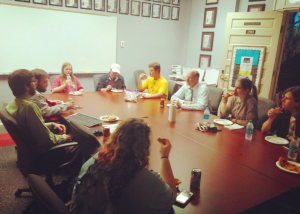 On Monday, April 13th, the Religious Studies Student Association hosted an event where undergraduates gleaned insights about the ins and outs of applying to graduate school from the department’s very own Dr. Micheal Altman, Dr. Matthew Bagger, and Dr. Vaia Touna! In case you missed the event, Dr. Merinda Simmons has listed some advice of her own below!
On Monday, April 13th, the Religious Studies Student Association hosted an event where undergraduates gleaned insights about the ins and outs of applying to graduate school from the department’s very own Dr. Micheal Altman, Dr. Matthew Bagger, and Dr. Vaia Touna! In case you missed the event, Dr. Merinda Simmons has listed some advice of her own below!
1. In choosing where to apply for or go to grad school, savvy and patient web-surfing can go a long way. Specifically, look at faculty areas of specialization and publication. Are there people with whom you especially want to work? Particularly if you know vaguely what you want to study (or if there’s even a general area I know I want to do something with media, gender, etc), make sure there are people where you apply who would be able to work with you. These are likely the people who will eventually be part of your thesis or dissertation committee, and they are the people who will eventually write letters for you and help you network, etc. The professors who worked with me on my dissertation have been instrumental for me not only as I was writing but also as I embarked on my career after graduation. Knowing and working with a couple of those professors opened doors for me (with publications, lecturing invitations, and meeting other scholars, just to name a few things) because of their own wide professional network. I really can’t overstate the importance of building relationships early on with people whose work you admire/respect.
2. #1 said, don’t feel like you have to know exactly what you want to study or where you want your career to go! This is the punchline of practically all our grad tales events: Life intervenes, and we almost never wind up where we expect. So try to keep that in mind from the outset. Exacting expectations tend to translate into eventual disappointments where grad school is concerned. Entertain some flexibility where possible and enjoy the amazing opportunity that grad school offers: namely, you’ll have smart profs whose job it is to read and respond to your work, and you’ll have a ready-made cohort of peers who are interested in doing the same. All this is true despite your not having to have a specific career path or research agenda worked out early on.
3. This is a big one. In the application process, there are a few things you can control and so many more you can’t. Take some time to figure out what things belong in the former/first category, and spend energy working on those rather than worrying about the things in the latter category. Doing so will not only make the process less stressful but also help you practice exercising autonomy in an important transitional phase in your young adulthood. *Examples of things you can craft/control during the process: 1) your writing sample; 2) your personal statement; 3) the choice of schools to which you apply; 4) the choice of profs from whom you ask for letters of rec; etc. Some of these may deserve specific tailoring to various schools depending on their own priorities or interests spelled out on their websites. Give attention to the documents you send out (current profs would likely be willing to talk about and/or read drafts of your docs, for example), proofread those docs, and feel as confident as you can about what you send. The rest (priorities of the selection committee when they weed through applications, the kind of financial aid they can or can’t offer, the personalities of those reading your application, etc., etc., etc., etc.) lies far outside your knowledge or control. Try not to waste time worrying about all of that.
4. Ask profs for letters of recommendation at least a month in advance of the due date. Provide them with relevant info so that they can craft the best letter possible (titles of any papers/projects you’ve done in their courses, titles of courses where relevant, etc…If you already have a personal statement and/or cv and/or any other application docs you can share, that can be helpful too). A little professionalism in the request tends to go a long way in how they approach the writing process.